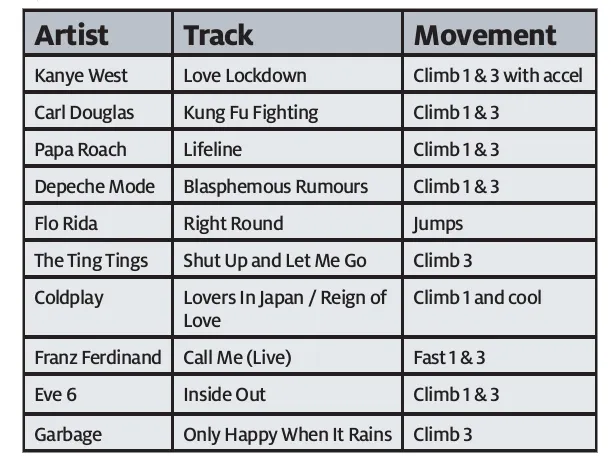When Ethiopian runner Haile Gebrselassie set an indoor 2,000m world record in 1998 he attributed his success to the fact that the beat of the song playing in the stadium matched his pace.
He’s not the only athlete to use music as a key part of training and race preparation and, what’s more, the power of carefully chosen tunes has been scientifically proven to benefit training and performance.
For cyclists who use indoor cycling (or spinning) as a core part of their regime, music can not only liven up an otherwise dull session, it can also help you to train more effectively.
Feel the rhythm
According to Dr Costas Karageorghis, head of the Music in Sport Research Group at Brunel University in London, science has revealed four main ways in which music can influence preparation and athletic performance.
The first is the fact that music can lower your perception of effort by as much as 10 percent (Karageorghis & Terry, 1999; Nethery, 2002; Szmedra & Bacharach, 1998), tricking your mind into feeling less fatigued during a workout and also encouraging positive thoughts – which ultimately means you feel less pain.
As Dr Victor Thompson, clinical sports psychologist and a keen triathlete and ironman, says: “When it’s time to redline it on the turbo, I use dance music. For me, it just makes the session go easier in terms of how much of a psychological effort it can be to push and hold levels of effort. Also, when sets are long, music helps the time to go quicker.”
Karageorghis’s research has also found that music with a fast tempo can be used to pump you up prior to competition, while slower music can be used to calm your nerves and focus – but finding the right tracks for you is crucial.
Sports psychologist Amanda Owens, who’s also on the British Olympic Association Advisory Panel, says, “It’s all very well getting nervous and psyched up, but if your adrenaline and endorphin levels are too high, too early, it can effect your arousal level to such an extent that there will be a massive dip in performance. Getting the music right in preparation is crucial. It’s about enabling athletes to be more self-aware and knowing what music makes them feel a certain way.”
A pedal in time…
Matching the beat of the music to the tempo of the exercise can also regulate an athlete’s movement and even reduce the oxygen required. In one study, participants who cycled in time to music found that they required seven percent less oxygen to do the same work compared to cycling with background (or asynchronous) music (Bacon, Myers, & Karageorghis, 2008).
This suggests that because the rhythmical qualities of music emulate the pedal action, music can enhance technique and make cyclists more efficient. Frances Mikuriya, a level three spinning instructor and founder of Spinaddikts.com, structures each class around the rhythm of the music. “For example, during a steady pace segment, it’s important that the music has a consistent tempo so that the riders can utilise the rhythm to maintain their cadence," she says.
"For hills, I choose music that has a slower tempo, so that the rider’s cadence can match up to a realistic hill climb of between 60-80rpm. For sprints, I'd choose an extremely energetic track and sometimes with a variable rhythm that gradually picks up its tempo leading to the end of the sprint phase. This method has helped to motivate individuals to continue at their optimum effort especially when they’re struggling and at the point of wanting to give up.”
But while music can undoubtedly boost the quality and enjoyment of a lonely session on the turbo bike, finding the optimum music is a very individual choice. Owens says: “There’s technique called ‘motivational interviewing’, designed to understand what motivates an athlete as well as getting them to understand their own emotional response to certain situations.”
This can be applied in music. For example, for some cyclists Underworld’s up tempo Born Slippy will conjure up memories of a fantastic night out and the positive association will inspire a greater RPM when training; for others, the track might conjure up memories of a relationship breakup and it’s likely to induce an introspective, negative state, which is less conducive to an effective training session. As Mikuriya says: “I often see someone who feels fatigued in the class all of a sudden become re-energised because of a specific track they really like or perhaps it’s reminiscent of a personal positive experience.”
Owens advises that cyclists should experiment with different types of music to find what works for them: “Having a log book that details which music causes which emotional response, including how motivated it makes you and whether it makes you feel positive or negative, is really helpful." She advises cyclists to be specific, for example, noting whether certain tracks enable you to increase RPM or the duration of the session.
Whether it’s Rihanna or Snoop Dogg that make you tick, finding songs with a tempo, or beats per minute (BPM), that matches your heart rate is vital. Karageorghis says athletes who want to elevate the heart rate to 120bpm during warmup should select music that has a tempo in the range of 80–130bpm, with successive tracks creating a gradual rise in music tempo to match the gradual rise in heart rate. Look for tracks by BPM at www.djbpm studio.com and compile your perfect play list – then get pedalling.
Indoor cycling instructor Elizabeth Jefferson (www.adventurecorps.com) says that matching these top tracks to these moves will provide you with a great workout:

NB. 1 means seated with the hands on the top part of the handlebars; 3 means out of the saddle, leaning forward with your hands on the drops.
Music the cycling stars pedal to
- Bradley Wiggins (Olympic champion): Paul Weller, The Jam, The Who
- Chris Hoy (world champion, Olympic champion, Commonwealth champion): Chemical Brothers, Foo Fighters, Public Enemy, The Prodigy
- Lance Armstrong (seven-time winner of the Tour de France): Rage Against the Machine, Ryan Adams, Kings of Leon, Foo Fighters
- Craig MacLean (world champion and Olympic silver medallist): Foo Fighters, Metallica, Led Zeppelin
- Sarah Storey (Paralympic champion): Guns N’ Roses
- Hannah Mayho (European individual pursuit champion): Beyonce, Green Day
